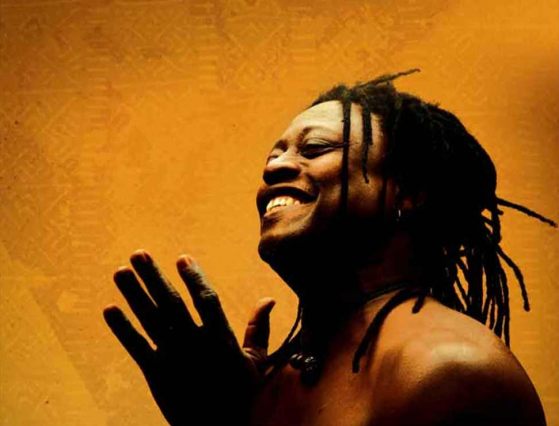Habib Koite, a singer and guitar player who lives in Bamako, Mali, in west Africa, will play at the Iron Horse in Northampton on February 16 at 7 p.m. Koite (pronounced KWA-tee) performed an outstanding public concert in Amherst in 2011. He possesses an unusually warm voice and guitar skills that inspired Bonnie Raitt to famously tell him after one concert, "I would drink your sweat."
Koite's music is unlike any other music. His album Afriki was recorded in Vermont, among other locations. It contains several songs that are, on their own, more than worth the price of the CD. But other tracks on Afriki are not up to Koite's normal standards -- though they are still better than 99.9 percent of music on the radio. Someone who has never listened to Koite should start with his stellar albums Baro and Ma Ya. Every song on those two albums is stunning.
I interviewed Koite by phone a couple of years ago. He was in Belgium, in a small village "with cows and lambs," he said, on a day off from a series of concerts around Europe. He spoke about his childhood in rural Mali, his music, and his thoughts on what Americans can do to help reduce poverty in Africa.
The average life expectancy in Mali is 48 (it's 77 in the US). Ninety-one percent of people in Mali live on less than $2 a day. Koite invited Oxfam, a group that fights global poverty, to accompany him and sign up new members on his most recent US tour. Koite said he is not an expert on poverty reduction, but his comments on the subject suggested otherwise. "Most of the money the UN spends in Mali goes to UN workers," he said. "They live in big houses and drive beautiful four-wheel drives. People who give money to Africa must think of new ways to help." One such way, he suggested, is for Americans and Europeans to lobby their elected officials to reduce domestic farm subsidies. "Farmers in Mali grow some of the best cotton in the world," Koite said. "But they can't sell it because cotton farmers in America and Europe get so much money from their governments." One of Koite's best-known songs, and one of the few he sings in English, is "Cigarette Abana," an anti-smoking anthem with a sense of humor.
Koite was raised mostly by his grandparents in a small Malian village. They were farmers. His mother and father lived in the city. His father was a train repairman, his mother a musician who was paid to perform at weddings and other celebrations. Koite has 17 siblings; his father had four wives. Koite has just one wife and three children. Anyone who has read the famous novel "God's Bits of Wood" by Sembene Ousmane of Senegal can probably get a pretty good idea of what Koite's early life was like in west Africa.
Koite's music is inspired by the music of half a dozen tribes in Mali, each with its own language. Koite makes a point of singing at least a few lines of each song in the language of the tribe that inspired it, even if he doesn't speak the language. He speaks fluent French and decent English.
People in the audience often dance at Koite's concerts. Koite has traveled and performed all over the world. But he says he hasn't ever wanted to live anywhere besides Mali. "For me, Mali is the best life," he said. "I have a very good life there. Many young Africans now want to go to Europe or the United States because of what they see on TV. But the reality is not like their dream. I want to give some hope to them that they can be someone in their own country. If I stay in Mali, maybe others will want to do the same." Koite says his favorite musicians are Jimi Hendrix and Stevie Wonder, and fellow Malians Salif Keita and Ali Farka Toure. At college in Mali, he studied the music of Bach. When Koite's music professor died, Koite got his job. He says it was easier to get to know western music than the music of his native country. Malian radio and TV stations rarely play traditional local music.
According to the David Hecht of the New York Times, traditional Malian music "shares at least one common characteristic: little melodic loops that repeat, sometimes for hours.... For Western ears, its sameness and repetitive structures have about as much appeal as Chinese opera." If that's true, Koite is an outstanding translator of music. I have yet to meet a Westerner who, having heard Koite's music, didn't like it.
Koite has recorded several studio albums, and a live album. "Baro" (2001) and "Ma Ya" (1999) are the best of the studio recordings, and are among the best recordings by any African artist; "Foly," the concert recording, lacks the clean sound and delicious pauses that make the studio albums mesmerizing.
More information is at www.HabibKoite.com and www.iheg.com.
----------
A video of a brief interview with Koite, and of him playing a song with his band, is at:

Thanks for your review of
Thanks for your review of Habib Koite. I downloaded 'Ma Ya.' Beautiful music.
-Robert Wood
San Jose, California
Post new comment